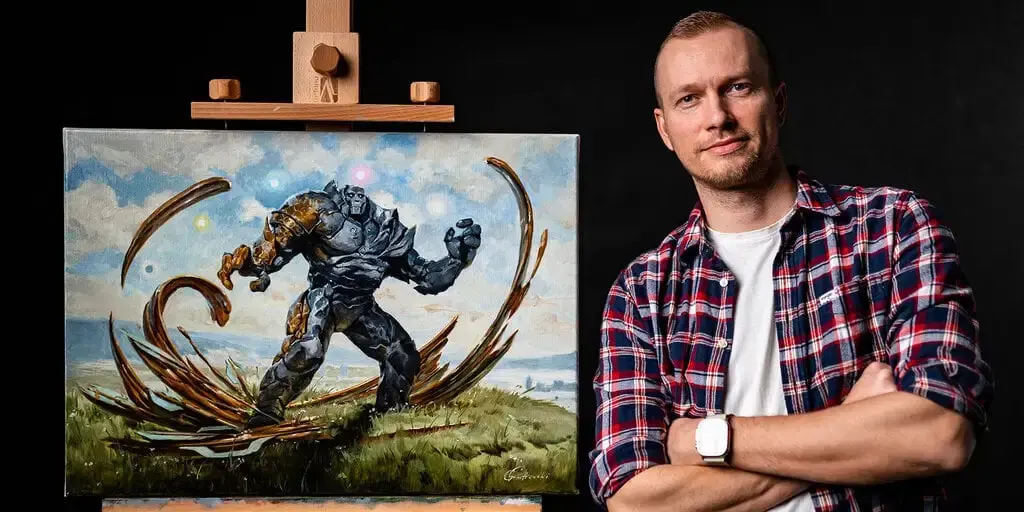Greg Rutkowski, a digital artist known for his surreal style, opposes AI art but his name and style have been frequently used by AI art generators without his consent. In response, Stable Diffusion removed his work from their dataset in version 2.0. However, the community has now created a tool to emulate Rutkowski’s style against his wishes using a LoRA model. While some argue this is unethical, others justify it since Rutkowski’s art has already been widely used in Stable Diffusion 1.5. The debate highlights the blurry line between innovation and infringement in the emerging field of AI art.



All this proves to me, based on the context from this post, is that people are willing to commit copyright infringement in order to make a machine produce art in a specific style.
It doesn’t say anywhere they used copyrighted art though?
Seems the new model might use art inspired by him, not his art itself.
It’s a moral gray zone. If you add enough freely available works inspired by someone, the model can produce a similar style without using any original works.
Is it still copyright infringement at that point?
Its unlikely that this did not use his work, these models require input data. Even if they took similar art, that would only resolve the issue of Greg himself but would shift it to those other artists. Unless there is some sort of unspoken artistic genealogical purity that prevents artists with similar or inspired styles from having equal claim on their own creations when inspired by another.
It also could be outputs generated from another AI model. But I don’t think people who see ethical problems in this care about the number of steps removed and processing that occurs when the origin is his artwork and it ultimately outputs the same or similar style. The result is what bothers people, no matter how disparate or disconnected the source’s influence is. If the models had simply found the Greg Rutkowski latent space through random chance people would still take issue with it.
The ability and willingness to generate images in a style associated with a person, without consent, is a threat to that persons job security and shows a lack of value for them as a human. As if their creative expression is worth nothing but as a commodity to be consumed.
The people supporting this don’t care though. They want to consume this person’s style in far greater quantities and variations then a human is capable or willing to fulfill. That’s why these debates are so fierce, the two sides have incentives that are in direct conflict with one another.
We currently lack the economic ingenuity or willingness to create a system that will satisfy both parties. The barrier of entry to AI is low, someone at home has every incentive to maintain the status quo or even actively rail against artists. Artists will need a heavy handed approach from the government or as a collective to combat this effectively.
You can’t own an art style. Copyright only extends to discrete works and characters. If I pay a street artist to draw a portrait of me in the style of Picasso, I’m not devaluing Picasso as a person.
I agree that you can’t own an art style in the US and I don’t know if there’s any other legal basis for artist’s claims.
Legality doesn’t automatically deal with problems that are not based on whether something is legal or not. Losing money is losing money, regardless of if its the result of something legal. And people can feel devalued by something that is legal. It just means that the government will not use force to intervene in what you’re doing and may in-fact use force to support you.
Picasso is dead, so he has no ability to feel devalued. Artists who are alive do have that ability and other living people who value his works do as well.
I myself support and love this technology. But it is clear that it causes problems for some people. I would prefer for it to exist in a form where artists could get value from and be happy with it too, but that is just not the case at present.
This is an interesting point, and you get into some real Ship of Theseus territory. At what point is it no longer based on his work? How many iterations before he no longer has any claim to it at all?
Its certainly interesting, but its ultimately going to be wherever we collectively decide.
One thing modern ML advancements have made painfully clear is that something being the “same” is variable based on what definition you use to determine sameness. Is it the same crew, same look, same feel, same atoms, same purpose, same name, etc… In the absence of such definition, everything ceases to be the same the moment after it has been described. As every single thing is constantly changing.
Living things naturally generalize similarities, relationships, and associations into patterns that are re-used and abstracted. So we very much take these things for granted.
If you like that type of thing you may enjoy Funes the Memorious by Luis Borges
If it’s inspired then at that point I guess it might not be copyright infringing unless it’s an accurate enough recreation of a copyrighted piece… And it looks like my mind filled in the gaps to assume it was copyrighted work being used.